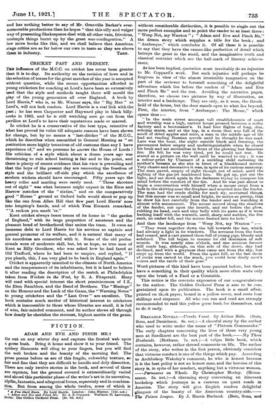FICTION.
ADAM AND EVE AND PINCH ME.t
Go out on any winter day and capture the frosted web upon a gorse bush. Bring it home and show it to your friend. The spidery filaments will cling to your fingers, but you will find the web broken and the beauty of the morning fled. The prose poems before us are of this fragile, cobwebby texture, so fair and fine that they are difficult to handle and defy dissection. There are only twelve stories in the book, and several of these are reprints, but the ground covered is extraordinarily varied and showi this particular phase of the writer's art in its narrative, idyllic, fantastic, and allegorical forms, separately and in combina- tion. But from among the whole twelve, none of which is • A Few SAort Runt. By Lord Harris. London : John Murray. [12s. net.[ t Adam and Eve and Pinch Me. By A. E. Coppard. Waltham St. Lawrence, Berke: The Golden Cockerel Press. [4s. Od. net.1 without considerable distinction, it is possible to single out the more perfect examples and to point the reader to at least three : " Weep Not, my Wanton " ; " Adam and Eve and Pinch Me," the dream story which supplies a title for the book ; and " Arabesque," which concludes it. Of all these it is possible to say that they have the cameo-like perfection of detail which betrays the great in the small, and the imaginative truth and classical restraint which are the hall-mark of literary achieve- ment.
As has been implied, quotation must inevitably do an injustice to Mr. Coppard's work. But such injustice will perhaps be forgiven in view of 'the almost irresistible temptation on the part of the reviewer to forestall something of the delightful adventure which lies before the readers of " Adam and Eve and Pinch Me " and the rest. Avoiding the narrative pages, therefore, we choose two pictures by way of illustration, an interior and a landscape. They are only, as it were, the thresh- hold of the house, but the door stands open to what lies beyond. First, the interior, from " Arabesque : The Mouse," which opens thus :- " In the main street amongst tall establishments of mart and worship was a high, narrow house pressed between a coffee factory and a bootmaker's. It had four flights of long, dim, echoing stairs, and at the top, in a room that was full of the smell of dried apples and mice, a man in the middle age of life had sat reading Russian novels until he thought he was mad. Late was the hour, the night outside black and freezing, the pavements below empty and undistinguishable when he closed his book and eat motionless in front of the glowing but flameless fire. He felt he was very tired, yet ho could not rest. He stared at a picture on the wall until he wanted to cry ; it was a colour-print by Utamaro of a suckling child caressing its mother's breasts as she sits in front of a blackbound mirror. Very chaste and decorative it was, in spite of its curious anatomy. The man gazed, empty of sight though not of mind, until the sighing of the gas-jet maddened him. He got up, put out the light, and sat down again in the darkness trying to compose his mind before the comfort of the fire. And he was just about to begin a conversation with himself when a mouse crept from a hole in the skirting near the fireplace and scurried into the fender. The man had the crude dislike for such sly, nocturnal things, but this mouse was so small and bright, its antics so pretty, that he drew his feet carefully from the fender and sat watching it almost with amusement. The mouse moved along the shadows of the fender, out upon the hearth, and sat before the glow, rubbing its head, ears and tiny belly with its paws as if it were bathing itself with the warmth, until, sharp and sudden, the fire sank, an ember fell, and the mouse flashed into its hole."
And then the landscape from " Weep Not, my Wanton " :-
" They went together down the hill towards the inn, which had already a light in its windows. The screams from the barn bad ceased, and a cart passed them full of young pigs, bloody and subdued. The hill began to resume its old dominion of soft sounds. It was nearly nine o'clock, and one anxious farmer still made hay, although, on this side of the down, day had declined, and with a greyness that came not from the sky, but crept up from the world. From the quiet hill, as the last skein of cocks was carted to the stack, you could hear dimly men's voices and the rattle of their gear."
Word-pictures of this kind have been painted before, but these have a something in their quality which more often waits only upon the brush of a Faed or a Constable.
This notice is the concrete expression of our congratulations to the author. The Golden Cockerel Press is also to be con-. gratulated upon its publication. The book is a small affair, printed on think paper, bound in a yellow cover, and costs four shillings and sixpence. All who can run and read are strongly recommended to raid this yellow gorse bush for themselves, and
to do it early.


































 Previous page
Previous page